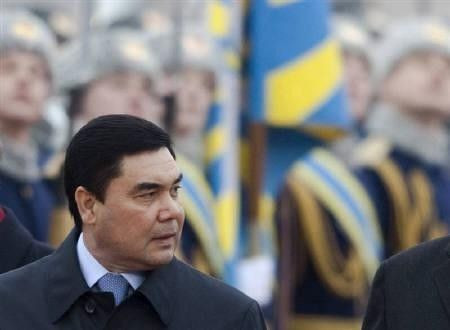Turkmenistan Leader Appears Likely to Win Easy Re-election

(Reuters) -- Turkmenistan votes on Sunday in a one-sided election certain to extend the rule of President Kurbanguly Berdymukhamedov over a Central Asian country holding 4 percent of global natural-gas reserves, which rights groups rank among the world's most repressive.
Berdymukhamedov, a 54-year-old qualified dentist, is also prime minister, commander of the armed forces, and chairman of the only political party in Turkmenistan. His word is final in the former Soviet republic, which borders Afghanistan and Iran.
Few citizens recognize anyone on the ballot paper other than the president, whose portrait -- showing him smiling and dressed in a business suit and tie -- can be found in parks, streets, offices, and hotel lobbies across the desert nation of 5.5 million people.
Icy roads and frosts greeted the first trickle of voters who made their way to polling stations in Ashgabat, the country's showpiece capital. Piped music filled the air along the city's fountain-lined avenues as the sun came up.
Berdymukhamedov's seven token challengers, including government ministers and the director of a state-run textile factory, have lauded the president in the run-up to the vote.
The Organization for Security and Cooperation in Europe has not sent observers, after deciding during a prevote mission to the country in December that its presence would not add value, given limited freedoms and lack of political competition.
Shary, a 20-year-old taxi driver who gave only his first name, said he did not need to visit a polling station because election officials would bring a ballot box to his home. They will come with a ballot box, and I will vote, although nothing depends on me, he said.
Russian television channels, picked up by satellite dishes that crowd the roofs of Soviet-era apartment blocks in Ashgabat and other cities, are a rare connection with the outside world in a country where Facebook and YouTube are blocked.
After winning the last presidential election in February 2007 with 89 percent of the vote, Berdymukhamedov began gradually to dismantle the often bizarre cult of personality around Saparmurat Niyazov, the country's first post-Soviet leader, who died of a heart attack.
He has restored the traditional names of the months, which had been altered by Niyazov to honor national symbols. For several years, January had shared Niyazov's adopted name of Turkmenbashi -- Head of All Turkmen.
The Patron
Keen to diversify gas sales and attract investment, Berdymukhamedov has engaged foreign governments and promised economic reforms while avoiding the more eccentric traits of his predecessor, who banned opera, circus, and gold teeth.
Some analysts say the elections are being choreographed to present an image of democracy to the West, where energy companies are vying for a share of the world's fourth-largest natural gas reserves, along with oil fields in the Caspian Sea.
China is in pole position to snap up these resources, having lent more than $8 billion to help Turkmenistan develop its energy sector and built a 1,250-mile pipeline to its border, while talks on a trans-Caspian route to Europe drag on.
Although his absolutist tendencies pale next to those of his predecessor, Berdymukhamedov is becoming more ubiquitous. His subjects call him Arkadag: The Patron. Lawmakers have bestowed upon him the title Hero of Turkmenistan.
International rights groups also say there is little evidence that Turkmenistan is improving its human-rights record.
Amnesty International, in a statement two days before the election, said it was concerned about torture and ill treatment in Turkmen prisons, as well as severe restrictions on freedom of movement and expression, political activism, and faith.
Turkmenistan remains closed to international scrutiny by choice, said John Dalhuisen, Amnesty International's Europe and Central Asia deputy program director. The organization said its repeated requests to visit the country had gone unanswered.
Only North Korea and Eritrea ranked lower in the 179-country press freedom index compiled by Reporters Without Borders. Human Rights Watch said in its latest annual report that media and religious freedoms were subject to draconian restrictions.
Turkmenistan has 2.9 million registered voters, slightly more than one-half of the total population.
(Writing by Robin Paxton; Editing by Michael Roddy)
© Copyright Thomson Reuters {{Year}}. All rights reserved.






















